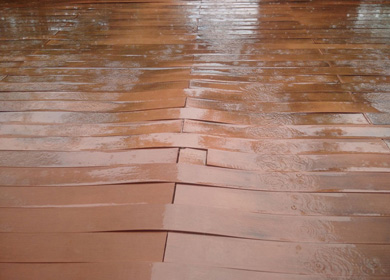
When considering adding a new composite deck to your property, it's natural to ask yourself questions regarding its suitability such as "how much does composite decking cost?" "How long does it last?" "Do I need to paint composite decking?" And "does composite decking warp like other types of decking?"
There's no problem with being cautious, in fact, it's good to cover all bases and make sure that your money is being spent on something that will ultimately add value to your home and life and composite decking isn't immune to such considerations.
In this blog, we try to make this process a little easier by answering one of these questions and hopefully giving you somewhat peace of mind that your money is being well spent. So, if you're wondering does composite decking warp, let's find out!
What causes decking to warp?
Before we take a look at composite decking, let's first establish why decking warps in the first place. By doing so, you'll better understand how composite decking works to reduce these effects as much as possible.
Warping occurs when the surface of your deck becomes too hot and gradually starts to distort. Thermal expansion or temperature changes are the most common causes of deck warping.
Here, the heat absorbed by your deck during periods of hot weather causes the body of the board to expand, bend and become flexible. When the high temperatures drop and your deck boards begin the cool, the bendy shape of the board hardens and becomes permanent, leaving your deck looking like an unsightly mess. Warped deck boards not only look bad but also impact the overall durability of your deck, drastically reducing its longevity.
Composite decking and warping
When it comes to composite decking and warped boards, the chances of this happening are reduced drastically thanks to its superior manufacture.
Using a combination of synthetic materials and real wood flour, composite decking takes advantages of both plastic and natural wood decking. Finished with a protective polymer sleeve for added protection against the elements, composite decking carries far fewer risks of warping than other decking types.
One of the biggest advantages that composite decking offers is extreme resistance to heat, meaning during periods of hot weather, composite boards do not absorb heat like their plastic and wood counterparts. Here, minimal heat is taken in so that the composite board does not expand or become flexible, resulting in a more hard-wearing and robust flooring option.
However, this does not mean that composite doesn't warp.
Can composite decking warp?
Just because composite decking is heat-resistant and far less likely to expand when hot, it doesn't mean that it can't happen.
When installing composite boards, it's advised to install each board around 3-5mm apart to give each board enough room to move without interference if they ever were to expand. If not, when expanding the boards can come into contact and push against each other which causes the bowing effect to occur. This can also happen when expanding composite boards come into contact with a fixed object such as a wall, however, it is extremely unlikely.
Our composite decking boards
Here at DeckPlus, we supply top-quality composite decking boards that are made from the finest raw materials, ensuring the finished product is one that is built to last.
As well as being heat-resistant, our boards are also resistant to all types of stains, fades and abrasions, making them the perfect choice for any outdoor living space.
You can browse our full collection of composite decking below, clicking on any desired product to learn more.
Our Composite Decking >